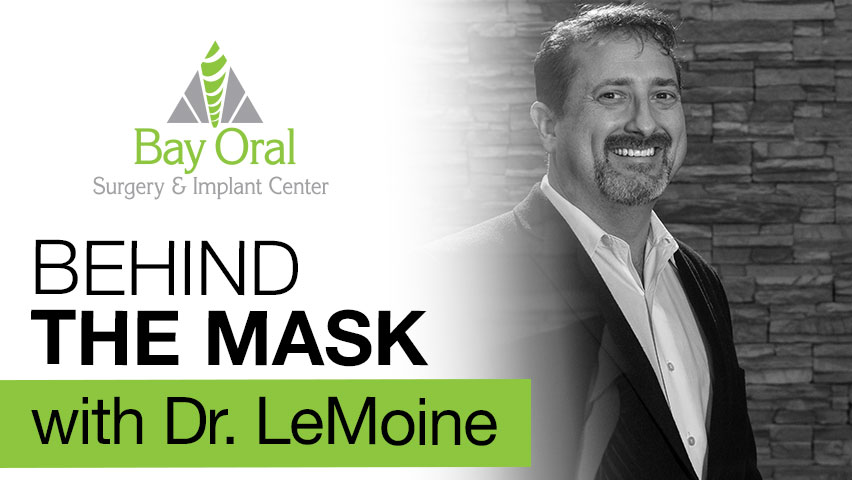
by Bay Oral Surgery | Dec 16, 2020 | Blog

Dr. LeMoine is a Green Bay native. He went to East DePere public schools until high school, in which he attended Abbot Pennings High School and graduated in 1989. After high school, he did his undergraduate education at UW-Madison. Dr. LeMoine then attended University of Minnesota School of Dentistry from 1993-1997, did his internship in oral & maxillofacial surgery at the Medical College of Wisconsin from 1997-1998, and completed his oral & maxillofacial residency at the Medical College of Wisconsin (also including: Froedtert Memorial Lutheran Hospital, Clement J. Zablocki VA Medical Center, and Children’s Hospital of Wisconsin) from 1998-2002. He has been with Bay Oral since 2002.
Dr. LeMoine reflected on why he decided to get into the oral surgery field and what he loves about being an oral surgeon:
“I grew up in an oral surgery family. As early as I can remember, I was with my father (Dr. David LeMoine) in his office watching him help people in pain on the weekends. It always felt right to pursue this profession.”
“I enjoy being the final referral for patients who have seen multiple other professionals without having their issues addressed to their satisfaction. It is gratifying to help people alleviate their pain complaint. I also enjoy the variety of treatments we can provide. Every work day is different.”
Dr. LeMoine has many professional memberships and affiliations, including:
- Fellow, International College of Dentists
- Board Certified Diplomat, American Board of Oral & Maxillofacial Surgeons
- Board Certified Diplomat, American Society of Dental Anesthesiologists
- American Academy of Implant Dentistry
- Wisconsin Dental Association
- American Dental Association
- American Association of Oral & Maxillofacial Surgeons
- Brown Door Kewaunee Dental Society
He is credentialed at all four Green Bay hospital facilities (St. Mary’s Medical Center, St. Vincent Hospital, Bellin Memorial Hospital, Aurora BayCare Medical Center).
A glimpse at Dr. LeMoine’s personal life:
“Outside of oral surgery, my wife and I work hard to nurture and raise our five children in an increasingly challenging world. We also maintain a ‘hobby farm’ with mini donkeys, a mini horse, a pony, goats, pigs, and chickens. We have 5 dogs, a hamster, and an African Grey parrot (who enjoys mimicking my voice the most). All of this keeps us busy and focused on our family and our home. In the summer months, we enjoy watersports at our lake home ‘up north’. In the winter, we try to find weekend time to hit the slopes. I also have an interest in researching and developing solutions for home automation and other ‘techy’ applications. I like technology, and I am excited to see what advances are coming in the years ahead.”
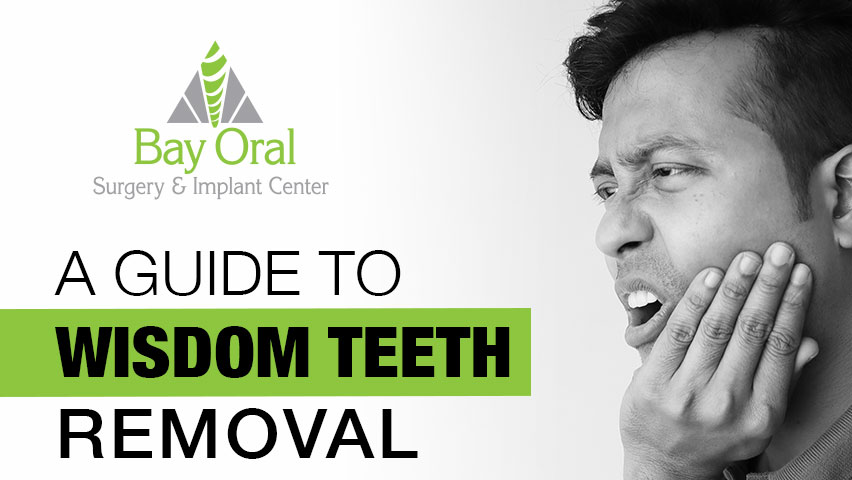
by Bay Oral Surgery | Oct 13, 2020 | Blog

Wisdom teeth, or third molars, are the last teeth to develop and appear in your mouth. The average mouth is made to hold only 28 teeth. These four extra teeth are your third molars. Early, preventative removal in teenage years is recommended to eliminate possible, future complications.
When should I have my wisdom teeth removed?
Wisdom teeth surgery is necessary when these teeth do not have room to properly erupt within the mouth. This typically occurs between the ages of 17 & 25. They may grow sideways, partially emerge from the gum, and even remain impacted and trapped beneath the gum and bone. When they are partially erupted, the opening around the teeth allows bacteria to grow and eventually causes an infection. The pressure from the erupting wisdom teeth may also move other teeth and disrupt their natural alignment. The most serious problem occurs when tumors or cysts form around the impacted wisdom teeth, resulting in damage to the jawbone and healthy teeth.
With an oral examination and x-rays, Bay Oral Surgery & Implant Center can evaluate the position of the wisdom teeth and catch potential problems. Studies have shown that early evaluation and treatment can prevent complications and decrease the surgical risk involved with the procedure.
Do I need sedation or anesthesia?
In most cases, the removal of wisdom teeth is performed under local anesthesia or deep sedation. These options, as well as the surgical risks, will be discussed with you before the procedure is performed. Once your wisdom teeth have been removed, you will rest under our supervision in the office until you are ready to be taken home. Upon discharge, additional instructions for care at home will be given.
What’s the cost of wisdom tooth extraction?
Wisdom tooth extraction costs vary depending on the number of teeth and their state of eruption. Given that every case is different, it’s difficult to quote a price without consulting one of Bay Oral Surgery’s expert oral surgeons first.
How is recovery after wisdom tooth surgery?
Pain, swelling and some bleeding is normal after wisdom teeth removal. Take it easy for a couple of days, avoid brushing near the healing area and eat what is comfortable, but softer foods are typically easier for the first few days.
If you have any questions or would like to schedule for your wisdom teeth removal, please call us at (920) 499-0471.
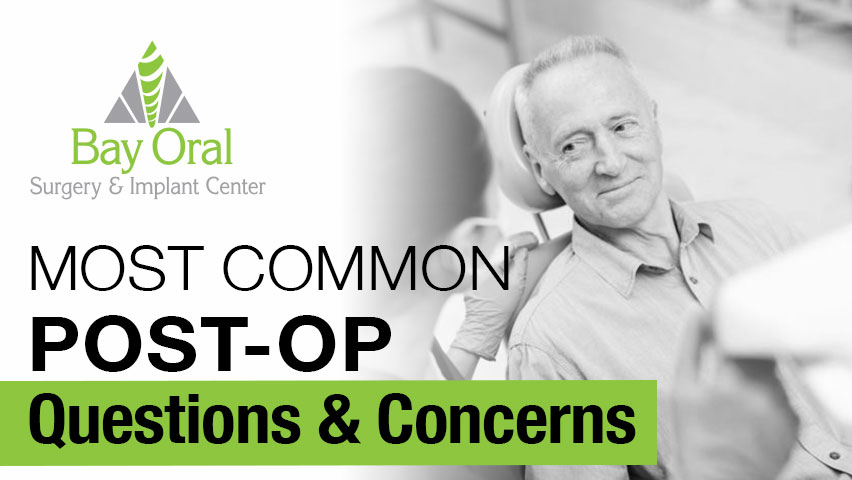
by Bay Oral Surgery | Sep 21, 2020 | Blog

Proper care and healing of your surgical site after undergoing oral surgery is important, and with that comes a lot of questions, which is to be expected. Here are some common post-operative questions from patients:
Can I eat after surgery?
Adequate food and fluid intake after oral surgery is important. Please eat whatever is comfortable to you; however, you may find that softer foods are easier (ex. jello, pudding, applesauce, ice cream, yogurt, cottage cheese, mashed potatoes, noodles, etc). If you are required to be on a no-chew diet, your doctor will provide you with dietary instructions.
Can I brush my teeth like normal after surgery?
On the day of your surgery, do not spit or rinse your mouth. You can use a wet toothbrush to clean your teeth, but do not use toothpaste.
On the day after oral surgery, you can brush your teeth as you normally would again. When brushing, be gentle in the extraction sites as they may be tender for a few days following the procedure. Brush as well as you can and rinse with salt water to aid in healing (1/2 teaspoon table salt in 8 oz warm water) 2-3 times per day. The use of commercial mouthwash is not recommended during the healing period.
A syringe, if provided, should not be used until one week after surgery. Use it to flush out the extraction site(s) as often as needed.
How do I know if I have a dry socket?
A dry socket (alveolar osteitis) is a painful dental condition that can occur after the extraction of a permanent adult tooth. It can occur at the site of the tooth extraction when the blood clot has been dislodged or has dissolved before the wound fully heals. Exposure of the underlying bone and nerves due to a dry socket results in severe pain. Pain that radiates from the socket to your ear, eye, temple, or neck on the same side of your face as the extraction is a common symptom. Your pain medication may not be as effective. To help minimize the potential for a dry socket:
- Do not use a straw for one week following surgery
- Do not spit or smoke for a least 3-5 days following surgery
How do I avoid an infection and/or how do I know if I have an infection?
Due to the enormous amount of bacteria or germs in the oral cavity, infections do sometimes occur following oral surgery. They usually can be treated simply, and they rarely reappear. To avoid further complications or problems, it is imperative that you follow these instructions:
- Take the antibiotic pills as directed and do not discontinue them until finished with the entire prescription or until the doctor tells you to do so.
- Applying moist heat over the swollen area is usually beneficial.
- Hourly warm salt water rinses are very helpful. Do not disturb your sleep to do this.
- Once treatment is started, you should see a decrease in the swelling and pain within 48-72 hours.
- If the swelling severely limits your ability to open your mouth or causes difficulty with swallowing or breathing, call our office immediately and/or go to the emergency room at the nearest hospital.
- It is imperative that you keep follow-up appointments, and report any significant changes in the pattern of swelling or pain immediately.
- It is not unusual to run a low-grade temperature. Be sure to drink plenty of fluids. Call our office if your temperature exceeds 100 degrees orally.
- It is important to understand that failure to follow any of the instructions as indicated above may result in serious complications, significant detriment to your health, and in some cases may be life-threatening. Your doctor is available to answer any questions concerning your surgery.
Is it normal to be in pain after surgery?
Most routine extractions do not cause much discomfort after the procedure. Over-the-counter medication should relieve your discomfort, unless you have been instructed by your physician not to use them. Taking 600mg of Ibuprofen (i.e. Advil, Motrin) every 6-8 hours will usually provide sufficient relief from pain and swelling. Another good pain reliever is Acetaminophen (Tylenol). If you are given a prescription for pain, please take it as directed. If needed, you may supplement your prescribed pain medication with Ibuprofen (ex. 1/2 tab prescription pain reliever and 3 hours later 600 mg of IBU, Motrin, or Advil).
- Pain is expected after surgery but should be managed with pain medication. If the pain is not manageable, please contact our office at (920) 499-0471.
- If an antibiotic was given, please take as directed. Because antibiotics taken orally can reduce levels of beneficial bacteria, you may want to take yogurt or acidophilus tablets.
- If sutures are used, they will dissolve on their own usually within 2 days but can last for up to 4 weeks.
- During healing, it is common to notice small bone fragments working their way through the gums. These bone chips will fall out on their own, or they can be removed if they are bothersome.
For more post-operative care instructions, visit our post-op page on our website. If you have any questions after your surgery at Bay Oral, please contact us. We are here to help!
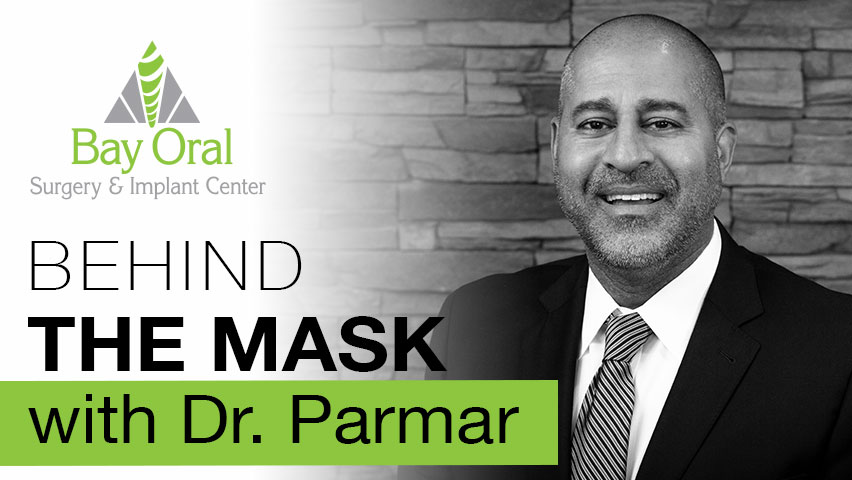
by Bay Oral Surgery | Aug 17, 2020 | Blog

Dr. Parmar attended Marquette University School of Dentistry from 1990-1994, did his general practice residency at the VA Hospital of Milwaukee from 1994-1995, and completed his Oral & Maxillofacial Surgery Residency at the Medical College of Wisconsin from 1995-1999. He has been with Bay Oral since 1999.
With 21 years of expertise, Dr. Parmar reflected a little bit on why he decided to get into the oral surgery field and what he loves about being an oral surgeon:
“I always wanted to be in the healthcare field, and the specialty of oral surgery seemed one of the more challenging so I was drawn to it.
I love getting to help people whose mouth is incomplete; to make them feel whole using both modern, state-of-the-art technology and basic, tried-and-true concepts of healing.”
Dr. Parmar has many professional memberships and affiliations, including:
- Wisconsin Dental Association
- Wisconsin Society of Oral & Maxillofacial Surgeons
- American Dental Association
- American Association of Oral & Maxillofacial Surgeons
- American College of Oral & Maxillofacial Surgeons
- American Academy of Implant Dentistry
- Board Certified Diplomat, American Society of Dental Anesthesiologists
He’s also the past President of the Brown-Door-Kewaunee Dental Society and past board member of Donated Dental Service.
A glimpse at Dr. Parmar’s personal life:
“I am married with 3 kids (pictured below). We enjoy skiing and being up north when we have free weekends.”
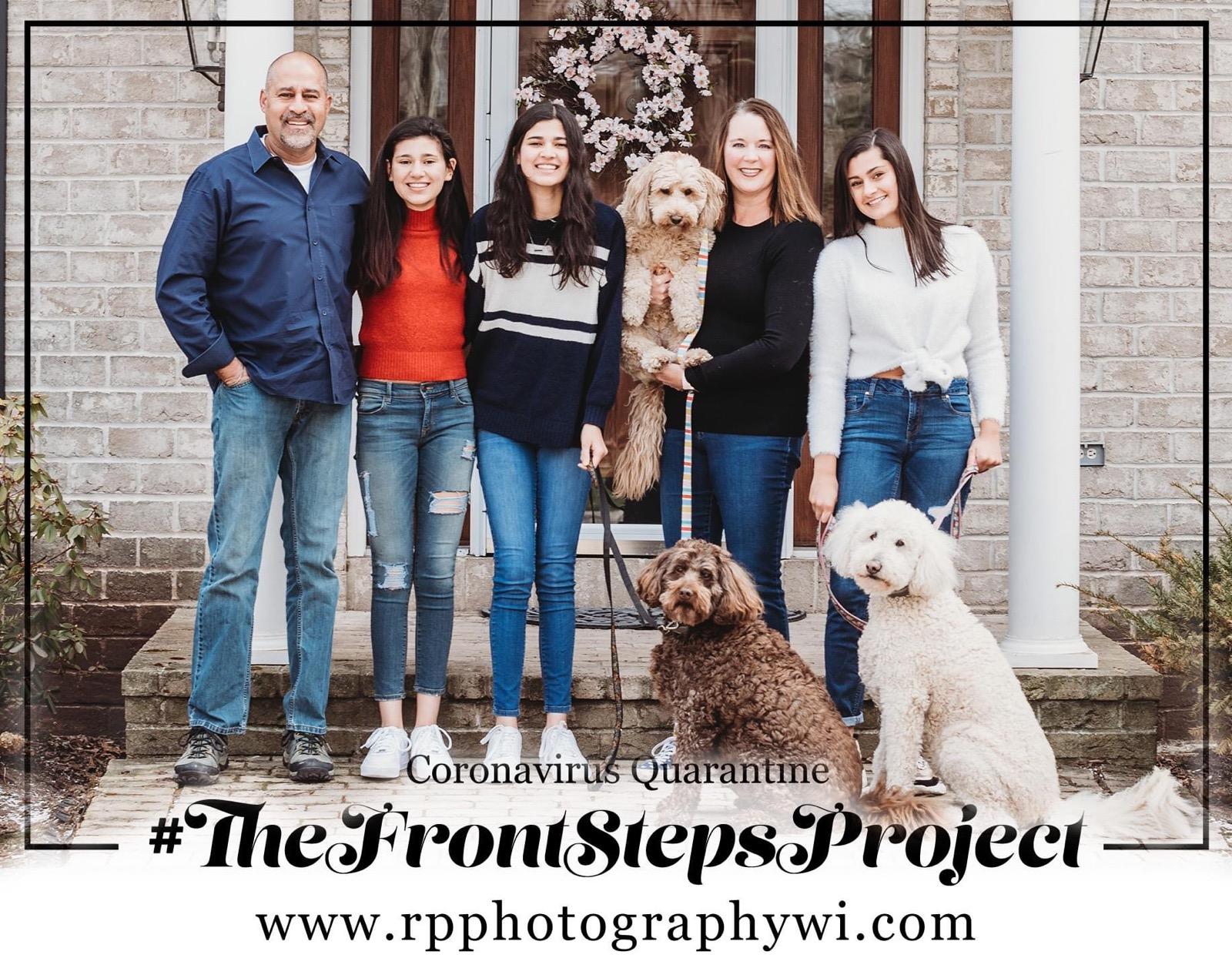
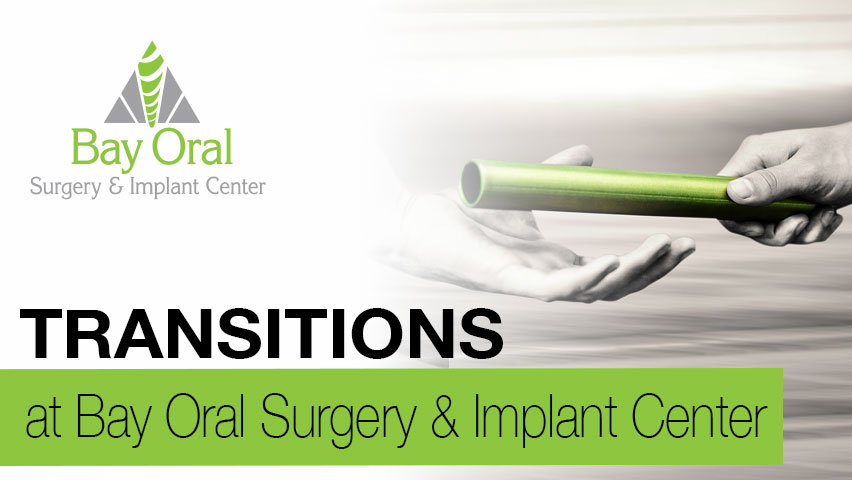
by Bay Oral Surgery | Jul 17, 2020 | Blog

Our beloved Ellen Greene has retired from her position as our Practice Administrator of 23 years, and we welcome Amy Kozloski as our new Practice Administrator!
We had to say goodbye to Ellen at the start of the COVID-19 pandemic, so unfortunately we were unable to give her the proper send-off to celebrate her innumerable contributions to Bay Oral.
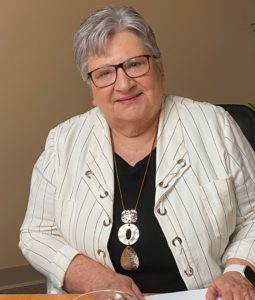
Here’s what Ellen had to say about her time at Bay Oral and her plans in retirement:
“For the last several years, people have asked me when I’m going to retire. My answer each and every time has been, ‘Why would I leave the perfect job?’ And in every way it has been the perfect job. Working for and with people you respect, admire and like is a gift to be appreciated, and I do!
We have been through it all together. Marriages, births, deaths, illnesses, recoveries, saying goodbye to old friends, saying hello to new team members, new doctors, new clinics, new technology. My memories are the celebrations. Lunches, after work events, parties, baby showers, really any reason to gather and laugh at the antics of ourselves but let’s be honest mostly the antics of the doctors: ‘Remember the time….’
How have we changed over the 23 years I have been at Bay Oral? Yes, we have grown, we have expanded, we have embraced new technology but fundamentally we haven’t changed at all. I accepted this position because it was evident that caring and compassion are the cornerstones. How can I help, what can I do for you, do you need anything, let me take care of that for you – these are the words that echo for me.
I will still volunteer, specifically at CASA of Brown County if they accept me. I will still travel, specifically to visit my friends Mark and Ron in Grants Pass, Oregon and Dave and Pat in Naples, Florida. I also want to take the Nordland train from Trondheim to Bodo Norway, which crosses the Arctic Circle. And I am definitely looking forward to building relationships and friendships along the way.”
Before Ellen retired, she had a key role in choosing her replacement, and she knew Amy was the perfect fit for Bay Oral. Amy started at Bay Oral in December 2019 and was able to spend a few months with Ellen before her retirement.
Introducing Amy Kozloski, our new Practice Administrator!

Here’s a little bit about Amy:
“I graduated from UW-Oshkosh with a business degree. After graduation, I worked for 13 years at Principal Financial Group where we worked with companies who are employee owned through an Employee Stock Ownership Plan (ESOP). I managed a team of retirement administrators spread throughout the country. Since my goal was to work in Green Bay, I left Principal to work at my family’s real estate company where I was doing commercial real estate and commercial property management for just over a year. That is when the opportunity at Bay Oral presented itself and I was excited to become a part of the team!
I’m trying to quickly learn as much as possible about the dental industry! The team has been very patient with my questions of “why” and stopping people in discussions to get further explanation on certain procedures.
My favorite thing about working a Bay Oral is working with a great team! The doctors are fantastic to work with and the team is a great group of people! Everyone takes a lot of pride in what they do and is always working toward providing the best patient experience they can!
I have 3 kids (ages 11, 9, and 6) who keep my husband and I very busy with their activities! We love watching their swim meets, softball/baseball games, basketball games, football games, and dance recitals!”
We are very proud to have Amy leading us. Our future looks bright! Welcome to the Bay Oral team, Amy!
Ellen, we wish you a very happy retirement, one that is as wonderful as you are!









